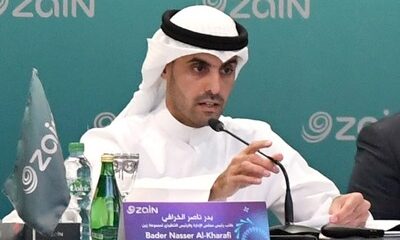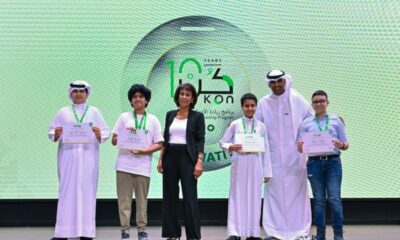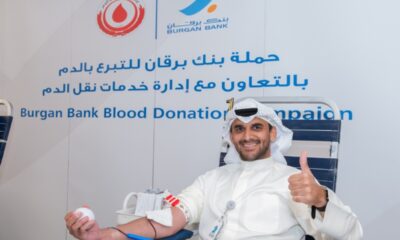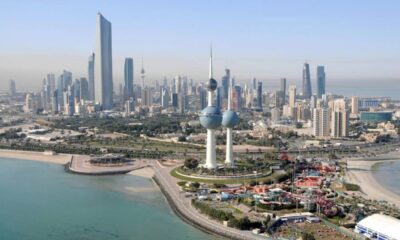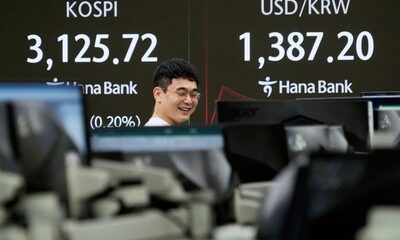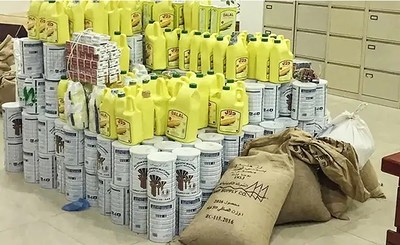KUWAIT CITY, Apr 23: Zain Group, a leading provider of innovative ICT and digital lifestyle communication services operating in eight markets across the Middle East and Africa, released its 14th annual sustainability report, entitled: ‘The New Paradigm Shift,’ reflecting the company’s dedication to responsible business practices. Zain remains one of the most transparent and accountable corporate entities in the entire Middle East and North Africa region with respect to the publication of its sustainability programs and their outcomes.
As in previous years, the report reflects Zain’s commitment to meaningful connectivity that leads to equitable systemic change and empowers the communities that Zain proudly serves, which is at the center of Zain’s Corporate Sustainability strategy on development and economic empowerment.
‘The New Paradigm Shift’ highlights the numerous sustainability programs and their outcomes implemented under the four pillars of Zain’s corporate sustainability strategy – namely ‘Climate Change; Operating Responsibly; Inclusion; and Generation Youth’; that embrace and emphasize the material importance to the company of addressing issues related to preserving the planet and safeguarding it for future generations; access to connectivity and reducing the digital literacy gap; displacement; as well as employee development and social well-being, given the rise in geo-political and economic issues regionally.
Commenting on the publication, Zain Group Chief Sustainability Officer, Jennifer Sulieman said, “We are in an era of technological innovation that allows us to develop and introduce initiatives that are the most impactful they have ever been. Zain takes responsibility as a regional pioneer in bringing the latest technologiesthat drive positive societal development and meaningful connectivity across our footprint.”
Suleiman continued, “What Zain does matters, and we continue to implement ESG principles, climate action, children rights, displacement, connectivity, advancing digital transformation, literacy, and stakeholder collaboration to build resilience, so that amid socio-economic challenges and regional conflicts, Zain may remain a beacon of hope, delivering life-changing solutions for the benefit and upliftment of current and future generations.”
Key highlights
During 2024, the company’s agenda continued to be driven by efforts to address socio-economic and environmental challenges across its footprint. Zain cemented the four pillars of its sustainability strategy through a comprehensive engagement process with various stakeholders. These included:
Climate Change:Focused on decarbonizing the business and transition towards Net-Zero by 2050 by receiving official approval from SBTi on its Net-Zero targets, Zain developed its water management plan to the unique conditions of each country operation. The plan detailed specific measures aimed at improving water usage across all of Zain’s markets that saw the company achieve a 5.89% reduction of water consumption in comparison to 2023.
Furthermore, Zain continued in its commitment to CDP and provided its Climate Change Action, demonstrating a commitment to biodiversity conservation and nature preservation as integral components of its broader dedication to climate action. For example, Zain Omantel International (ZOI) requires its partners to conduct thorough environmental impact assessments aligned with regulatory and international standards.
Operate Responsibly: Embedding Environment, Social, and Governance (ESG) principles across the entire value chain, the company further developed and scaled the supplier training program, launching its second training video highlighting the importance of upholding human rights, promoting ethical labor practices, as well assetting up grievance mechanisms. Zain trained 185suppliers in 2024 in Zain’s Supplier Code of Conduct, human rights and anti-corruption. Additionally, Zain continued its Supplier Self-Assessment questionnaire process with604suppliers groupwide to validate their commitment and alignment to sustainability policies and ethical principles.
In addition, the company continued to contribute to employment opportunities through Zain’s distribution channel, in 2024 the company generated around114,000 jobs across its value chain.
Inclusion:Aiming to reduce the digital inequality gap, the fourth cycle of ‘Women in Tech’ program launched inKuwait, Bahrain, Iraq, Jordan, Saudi Arabia and Sudanto better address the needs of the target community through focus groups, surveys, and feedback sessions. A total of 485young women joined the program across the Group, reflecting a 16% increase from 2023.Similarly, to better serve customers from the disability segment, the company provided specialized bundles for this demographic in Bahrain, Jordan, Kuwait and Saudi Arabia.
Zain continued to place a high priority on enhancing the skills of its employees either by upskilling or reskilling its workforce in line with the company’s 4SIGHT digital transformation strategy. The Zain Inclusion, Diversity, & Equity University (IDEU) continued its collaboration with the prestigious IE University in Spain with the aim of extending learning opportunities to 2,000 Zain employees to participate in an inclusive online Digital Transformation program, also offering the possibility of attaining a master’s degree.
Generation Youth:Aimed at building resilience across communities by targeting 16 million children and youth, the company was recognized amongst 3,000 of the largest corporations globallyon key children’s rights categories, whereby the company scored higher than the sector and industry averages, tripling the ranking of many regional corporates. In the benchmarking rankings, Zain scored 8.4/10 overall against a sector average of 5.6/10 and a regional average of 2.8/10. The average of all companies benchmarked was 4.3/10.
As an advocate for children’s rights and in alignment with the UN’s Sustainable Development Goal 16.2, which aims to end all forms of violence against children by 2030, Zain continued to support the cause by introducing a powerful campaign in response to the rising global violence that is impacting children disproportionately. This initiative followed the escalating crises and conflicts worldwide, where children are bearing the brunt of severe hardships and violence, affecting their physical and mental well-being.The campaign, titled #EveryChildHasRights, was designed to highlight the critical threats faced by children in conflict-affected regions and support for their protection. It included a compelling video underscoring the urgent need to safeguard children’s rights, engaging audiences in meaningful and emotional dialog. Through this campaign, Zain aimed to create a global call to action and foster a deeper understanding of the pressing issues at hand. The campaign successfully garnered 16.5 million impressions across Zain’s footprint during 2024, amplifying its message and driving significant awareness on this crucial issue.
Also in 2024, Zain launched a two-phase campaign on excessive screen timefocusing onboth children and parents, reaching 43.9 million impressions and prompting 82% of viewers to set screen time boundaries. Polls undertaken of the successful campaign indicated a 100% increased awareness on managing screen use.
Moreover, Zain continued its partnership with Child Helpline International (CHI), advancing its three-year MoU to support and improve the effectiveness of child helplines across Zain’s footprint. This collaboration strengthens engagement between helplines and key child protection stakeholders, including governments and regulators, while advancing platform technologies and expanding services to instant messaging and social media.
Towards the end of 2024, Zain unveiled a new enhanced five-year corporate strategy, ‘4WARD-Progress with Purpose’. The new program builds on the success of the 4SIGHT strategy and is focused on continuity, acceleration, collaboration and innovation, and is designed to foster value creation by accelerating the company’s evolution from a predominantly mobile centric operator into a purpose driven and sustainability focused technology entity. Zain looks to maximize its full potential as a customer-centric, future-proof, and impactful leading regional TechCo conglomerate, and its sustainability strategy will be adapted accordingly.

 Business21 hours ago
Business21 hours ago
 Politics10 hours ago
Politics10 hours ago
 Politics23 hours ago
Politics23 hours ago
 Latest News19 hours ago
Latest News19 hours ago
 Politics11 hours ago
Politics11 hours ago
 Politics22 hours ago
Politics22 hours ago
 Latest News21 hours ago
Latest News21 hours ago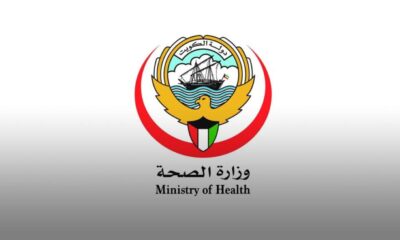
 Latest News11 hours ago
Latest News11 hours ago

